 Petzlover
Petzlover Both Domestic Shorthaired Cat and Pixie-bob are originated from United States. Both Domestic Shorthaired Cat and Pixie-bob are having almost same weight. Domestic Shorthaired Cat may live 5 years more than Pixie-bob. Both Domestic Shorthaired Cat and Pixie-bob has same litter size. Both Domestic Shorthaired Cat and Pixie-bob requires Low Maintenance.
Both Domestic Shorthaired Cat and Pixie-bob are originated from United States. Both Domestic Shorthaired Cat and Pixie-bob are having almost same weight. Domestic Shorthaired Cat may live 5 years more than Pixie-bob. Both Domestic Shorthaired Cat and Pixie-bob has same litter size. Both Domestic Shorthaired Cat and Pixie-bob requires Low Maintenance.
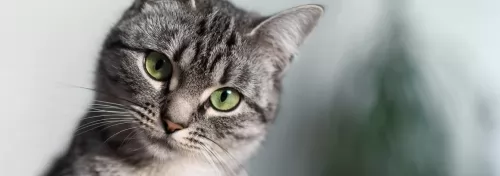 The Domestic short-haired cat has also got mixed ancestry and can have lots of different looks. In the UK they are often referred to as Moggie.
The Domestic short-haired cat has also got mixed ancestry and can have lots of different looks. In the UK they are often referred to as Moggie.
It is one of the most common cats in the United States. The roots of this cat go back to the pioneer settlement in North America where they were thought of as working cats. Nobody seems clear on where they originated from.
Hardy and unaffected, they quickly became a sought after cat that stood up well to all kinds of conditions. Even though this cat is a non-pedigreed cat, it is accepted by the Cat Fanciers' Association (CFA) in the Household Pets category.
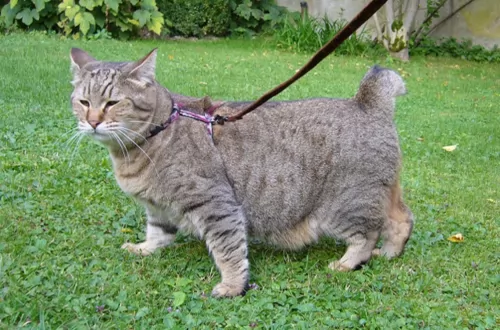 The Pixie-Bob breed is thought to have started from the unplanned litter of a bobcat and a barn cat in 1985. The whole idea of the Pixie-Bob was to get a cat that resembled the North American Bobcat.
The Pixie-Bob breed is thought to have started from the unplanned litter of a bobcat and a barn cat in 1985. The whole idea of the Pixie-Bob was to get a cat that resembled the North American Bobcat.
The barn cat belonged to Carol Ann Brewer, and she named a female kitten Pixie. Pixie became the foundation mother for this breed.
In fact, it was in 1989 that she wrote the first breed standard, naming the breed Pixiebob, in honor of Pixie. In 1998, the Pixiebob achieved TICA championship status. Today, the International Cat Association (TICA) recognizes the Pixie-Bob as a breed.
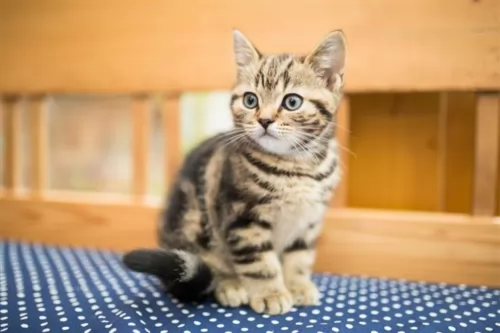 The Domestic short-haired cats can be so many things – different coat colors and different patterns as well as being different shapes and sizes.
The Domestic short-haired cats can be so many things – different coat colors and different patterns as well as being different shapes and sizes.
They can all have different shaped eyes and colors and their ears and tails can differ from cat to cat. The reason for this is that these cats don’t belong to a specific breed.
It has a mixed ancestral history. The Domestic Shorthaired varies in colors and size and their coats can be any color, solid or patterned. The length of the coat is short and is silky and shiny.
It’s a low shedding cat and grooming will be easy. Every cat has its own physical characteristics, and some can have a slight build while others are heavier built and more muscular.
You could find their eyes can be different colors too – blue, green, copper or brown.
Just like the Domestic Shorthair has lots of different looks, the temperament too varies. There is no set standard for these cats and when you choose a kitten, you can’t really be sure how they will turn out.
Your cat may be quiet, very vocal, active, placid, loyal loving, independent, playful or lazy – who knows with these wonderful cats?
Certainly, most of them are friendly, loving and loyal. They make wonderful pets for new cat owners, singles, couples, families and seniors.
People love them as they aren’t high maintenance pets – they are undemanding.
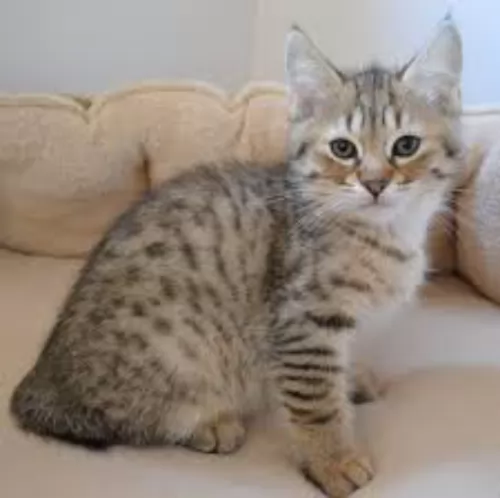 The Pixie-Bob is a medium to large cat that can weigh up to about 8kg. They stand between 25 and 33cm in height.
The Pixie-Bob is a medium to large cat that can weigh up to about 8kg. They stand between 25 and 33cm in height.
It's a muscular cat. These cats have a thick double coat which can be short-haired or long-haired. Most times they have a striped coat pattern with some rosettes. In fact, the pattern on the fur is much like that of a Bobcat.
Their eyes are triangular shaped and they have quite a distinctive heavy brow. The eyes are usually a honey color or they can be green. The tail is rumpy or non-existent or it can be a few inches in length. Sometimes the ears will have some feathering at the tips.
They are polydactyl which means that with their paws, they have more than the regular number of digits.
In spite of there being a wild side to this coat, they are amicable, fairly laid-back type of cats. Pixie-Bobs enjoy being with their owners, loving to quietly spend time with their human beings.
They’re not cats that form a strong bond with just one family member, but they are friendly with everyone in the family. When a stranger calls, they may run off however, to hide in a safe spot.
Some people describe them as dog-like. These cats also have a love for water so don’t be surprised if you see him spending a lot of time playing around his water bowl. This is a cat that just loves being the center of everything that is going on, and yet he has a calm aura about him.
The Pixiebob is talkative, chirping and chattering away as he tells you about what he has got up to during the day.
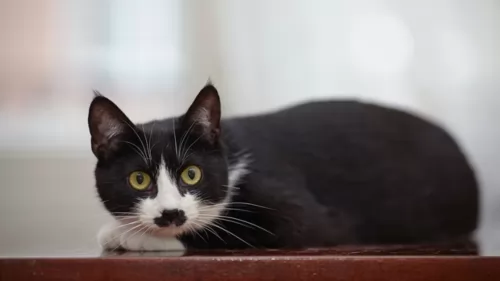 As we’ve already suggested, the Domestic Shorthaired has an easy-going personality, not demanding much from you except nutritious food and lots of love and attention.
As we’ve already suggested, the Domestic Shorthaired has an easy-going personality, not demanding much from you except nutritious food and lots of love and attention.
It’s important to provide your cat with a lifestyle that keeps him happy and content.
Rather than buy your pets lots of expensive cat accessories, your cat will be happier to do with less but to have more attention from you. This cat is willing to give you so much love and companionship ad he asks the same from you.
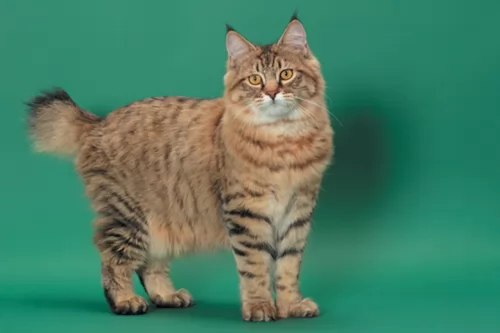 The Pixie-Bob just loves being around his human family and he forms strong bonds with them.
The Pixie-Bob just loves being around his human family and he forms strong bonds with them.
They are social cats and like a dog, they try to become involved in the going-on of the family. By treating this cat well and providing him with a loving home, he is capable of making you a most amicable and energetic member of the family.
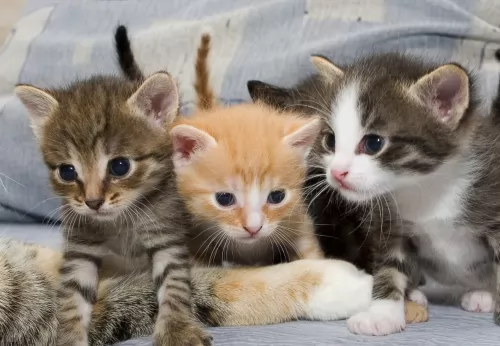 Because of their mixed breed, these Domestic Shorthaired cats don’t sicken easily and they are healthy cats and robust – less vulnerable to the genetic problems that plague purebred cats.
Because of their mixed breed, these Domestic Shorthaired cats don’t sicken easily and they are healthy cats and robust – less vulnerable to the genetic problems that plague purebred cats.
Nonetheless, he can succumb to illness and then you need to get him to the vet immediately. There are come cat illnesses that can kill your cat in just a few hours. Look at bloat as an example – this is when your cat’s stomach becomes swollen and your pet is weak and vomiting. It’s a life-threatening condition that can kill your cat in half an hour,
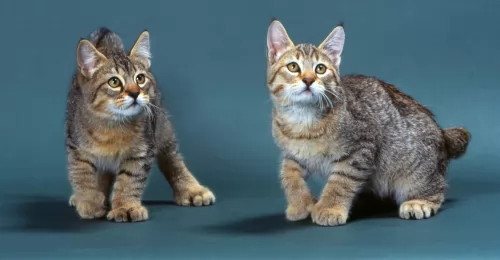 These are healthy cats and they don’t easily get sick. There are always some cat health issues that can crop up with any cat, and with the Pixie Bob, they seem to battle with delivering litters.
These are healthy cats and they don’t easily get sick. There are always some cat health issues that can crop up with any cat, and with the Pixie Bob, they seem to battle with delivering litters.
Sometimes you will hear of Cryptorchidism in these cats which means there is the absence of the testes or scrotum.
Whatever health issues your cat has, always make sure that you get him to the vet for his immunizations as well as for check-ups.
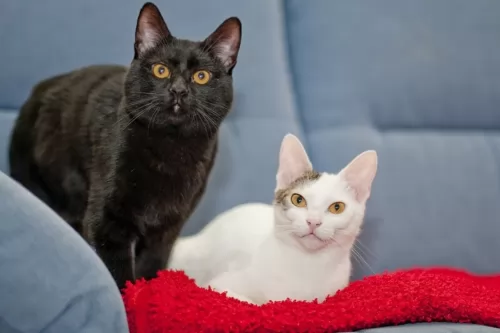 Just like you prepare for a human baby’s arrival, prepare for your Domestic Shorthaired’ arrival.
Just like you prepare for a human baby’s arrival, prepare for your Domestic Shorthaired’ arrival.
Have food and water bowls, a nice, dry, warm bed, toys to stimulate mind and body, litter box, scratching post, climbing tree and collar.
Have your cat neutered or spayed. This is to avoid unwanted kittens. You’ll often see these cats in animal shelters and you don’t want to add to the burden of these shelters. By neutering and spaying your cat, they behave in a better way. They are far less likely to want to roam away from home as well. A cat that have been neutered or spayed also enjoys a host of health benefits, and this common surgical operation is highly recommended.
Food for your cat is very important for good health. Do research and you’ll discover how imperative good gut-health is. A poor diet and the wrong diet can cause your cat to battle with a lot of poor health issues and digestive problems.
You’ll end up spending a fortune on your cat’s vet bills. A cat is a carnivore and it is most important to feed your cat meat. Check out the labels on the cat’s commercially manufactured food and choose the ones that make meat a top ingredient.
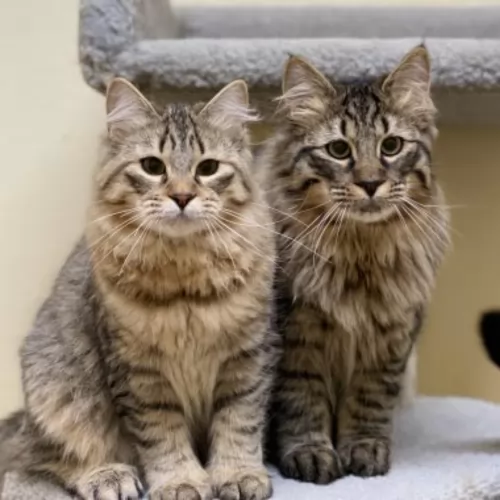 Pixie-bobs don’t require any special diet. When it comes to commercially manufactured cat foods, there are wet foods, dry foods and combination foods. You’ll find out what your cat likes, but remember that a cat is a carnivore and that meat is what they eat.
Pixie-bobs don’t require any special diet. When it comes to commercially manufactured cat foods, there are wet foods, dry foods and combination foods. You’ll find out what your cat likes, but remember that a cat is a carnivore and that meat is what they eat.
Always go for high-quality foods if you are able to because the best foods are better able to keep your cat healthy. The nutritional needs of a cat change as he grows and matures and there are cat foods specially manufactured for every season of your Pixie-Bob’s life.
Always ensure that there is a bowl of clean, fresh, cool water available to your cat.
The short hair of the Pixie-Bob means that it will be easy to give your cat a brush once a week to remove loose hairs.
Always get your cat to the vet when he shows signs of illness. If he comes to you as a kitten he will need his vaccinations as well as worm medicine. Your vet will inform you when to bring you cat in for the next round of vaccinations.